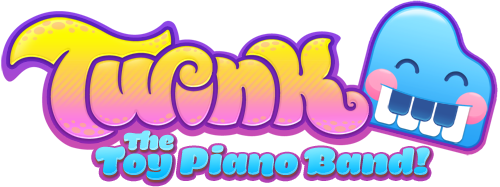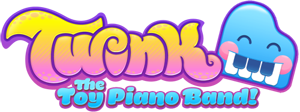Interview from SplendidEzine by George Zahora
Twink, aka Mike Langlie, created two wonderful, whimsical albums with his enormous collection of toy pianos: his 2002 self-titled debut and a follow-up, Supercute!, last year. When I received his most recent effort, The Broken Record, I was worried to see that he'd pushed the pianos aside in favor of a cut-and-paste project involving hundreds of children's records. I needn't have worried; as our review explains, The Broken Record offers ample joys of its own, and Langlie hasn't abandoned the pianos — as he explains in this Short Talk...
The Broken Record seems like a change of pace for you, but I'm guessing that it's been in the works a long time. I've read the short 'n' sweet press description, but tell me a little more about its genesis. What made you decide to do it?
I've been doing audio collage experiments since I was a kid, using whatever cheap tape equipment I could find. "Plunderphonics" and that kind of remix aesthetic really appeals to me; I've always loved the humor and surprise that comes from hearing familiar things out of context. Over the years I've done lots of mash-up type things, but until now never found an opportunity to make a full-length project with a cohesive theme. When I did the first few tracks for The Broken Record I didn't imagine releasing them as Twink, and debated whether or not it was appropriate to put it out under that name. Even though it's a break from my toy instrument stuff, I think the feel is essentially the same.
Speaking as a longtime (but purely hobbyist) cut-and-paster, I don't think that many listeners realize the amount of time and effort that goes into something like The Broken Record. I've seen the short take — three years, one Mac, one old record player — but could you walk us through your song-creation process in more detail (i.e. gear used, time involved, etc.)?
Some people are surprised by the amount of time and work I spent on this. They assume I just slapped some song pieces together like a mix tape. It's actually quite a dense arrangement of samples that took a lot of finessing to work together.
I spent over a year recording stacks of old kiddie records to my Mac, then cutting up the songs into little pieces. I made folders of riffs, loops, hits, sound effects, spoken phrases and words, etc. Constructing the tracks took almost two years. Sometimes I had clear ideas of what I wanted to do, but a lot of it came together by just sifting through the samples until something grabbed me. A lot of the things I'm happiest with came about through sheer serendipity of layering random or unlikely sounds, which would inspire what direction to take.
Which came first — your collection of children's records or the urge to make The Broken Record? Did you wind up scouring yard sales and resale shops for just the right Little Golden Book seven-inch, et cetera, or did you work with a fixed "palette" of material?
Pretty soon after starting Twink, I began collecting old children's music to get in the proper mood. I had a lot of records as a kid (all got broken of course), and loved the joy and whimsy of them. In rediscovering them, I was pleasantly surprised by how sophisticated the music really is. Even the seemingly simple tunes must have taken tons of effort to become so catchy. Not many friends shared my interest, which I found frustrating, so I thought of trying to present the music in a way that more people would appreciate. It's funny how deadly the "Children's Music" tag can be, it just shuts some people's minds off completely. Anyway, I hit eBay and all the Goodwills I could find for stacks of vinyl to get as much material as possible to work with. The Broken Record just scratches the surface of all the great music I ended up with.
From your perspective as a sample-hunter, what makes a "good" children's record?
The records I found go from the early 1930s to late 1970s. There's quite a range of instruments and sounds between them, from jazz ensembles to cheesy mono synths. But no matter what the sound is, I think the hook for a good children's record is to create an engaging world that kids want to visit and explore. Even now I gravitate towards albums that sound like documents from their own universe.
I don't know if you can comment on (and thereby confirm the presence of) specific samples, but I'd swear I heard some pretty familiar stuff in there — a bit of Dimension 5 stuff, maybe even the voice of a certain cardigan and tennis shoe-wearing child psychologist. Am I hallucinating? For that matter, what is the copyright situation with stuff like this? Were there any samples you couldn't use?
I tried to steer clear of stuff by the major studios or things that are still in print and readily available. It's my belief that this kind of release falls under fair use, but that's still being debated by lawyers all over. I wish I could have credited all of the sources, because the original artists are really the stars. Unfortunately, over half of the stuff I sampled either has no musician info or missing labels. I don't want people to think I'm trying to take advantage of someone else's work for my own gain... I really think of audio collage as a legitimate art form, and a way of appreciating what's come before in a fresh way. If my past albums are any indication, I'll be losing money on this disc anyway! It's totally a labor of love rather than trying to make a buck at all.
Seeland, Negativland's label, is a logical but somewhat surprising home for The Broken Record. How did you get hooked up with them? Did you know the Negativland guys already, or did they just respond well to a demo?
Midway through the making of the album I began to wonder if it was something worth releasing, and how to do it. Negativland's Seeland label was the obvious choice for me, as the artists they partner with share their cut-n-paste sound and sense of humor. I sent them a demo and was delighted by their positive feedback. I questioned the tolerability of the material, but they encouraged me to continue with it and make a full-length CD. Their input was minimal but very helpful in keeping me focused. I just feel really fortunate that they got what I was doing and found it good enough to support. I don't know who else would be brave enough to touch such a weird and potentially legally-troublesome disc.
One of the things I found most interesting about The Broken Record was the fact that it actually seems to be appropriate for kids; unlike, say, a lot of Negativland records, there's no political or sexual subtext, nothing sinister, etc. Was that part of your plan? Or did I just miss a lot of stuff?
Very early on in creating the tracks I realized how easy it would be to make completely filthy, over-the-top pieces. A lot of the language in the stories and songs has become very suggestive double-entendres over time, even without remixing to call out funny bits. Two things occurred to me though. One, that the obvious dirty joke would wear thin pretty quickly. And two, that I feel a responsibility to my listeners, which likely includes kids attracted by the fun sounds. I don't believe in censorship, but I like thinking that I have a wide audience that doesn't need to worry about what zingers might pollute sensitive ears. There's more ways to be sinister than shock value.
Has The Broken Record been played for kids? If so, how did they respond? I'm particularly interested in hearing how they respond to (what I'd call) more subversive tracks like "Alphabent" and "Let Me See How You Do It".
My friends' kids really seem to dig it, which I'm thrilled about. All my Twink stuff seems to get a good reaction out of kids and pets for some reason. "Alphabent" and "Animal Talk" are the favorites so far, even for adults. My hope is that the disc will make people want to go find and listen to the old weird kiddie records instead of buying into the watered-down stuff coming out today.
To wrap up... were there any sample-collage records that informed or inspired The Broken Record's creation? If so, give us a Top Five or something.
Once I had some tracks done I discovered The Bran Flakes, who have a similar sensibility, though not entirely children's record-focused. They're probably the closest to what I'm doing and I love their stuff. I've become online friends with Otis Fodder of the group, who encouraged me and actually contributed a couple samples when I was stuck at one point. Other sampling folks I really enjoy are Negativland (obviously), People Like Us, Wobbly, Cassetteboy, and The Evolution Control Committee. Some modern kids' music I love includes the French group Dragibus and the electro-pop Playsoundz.

